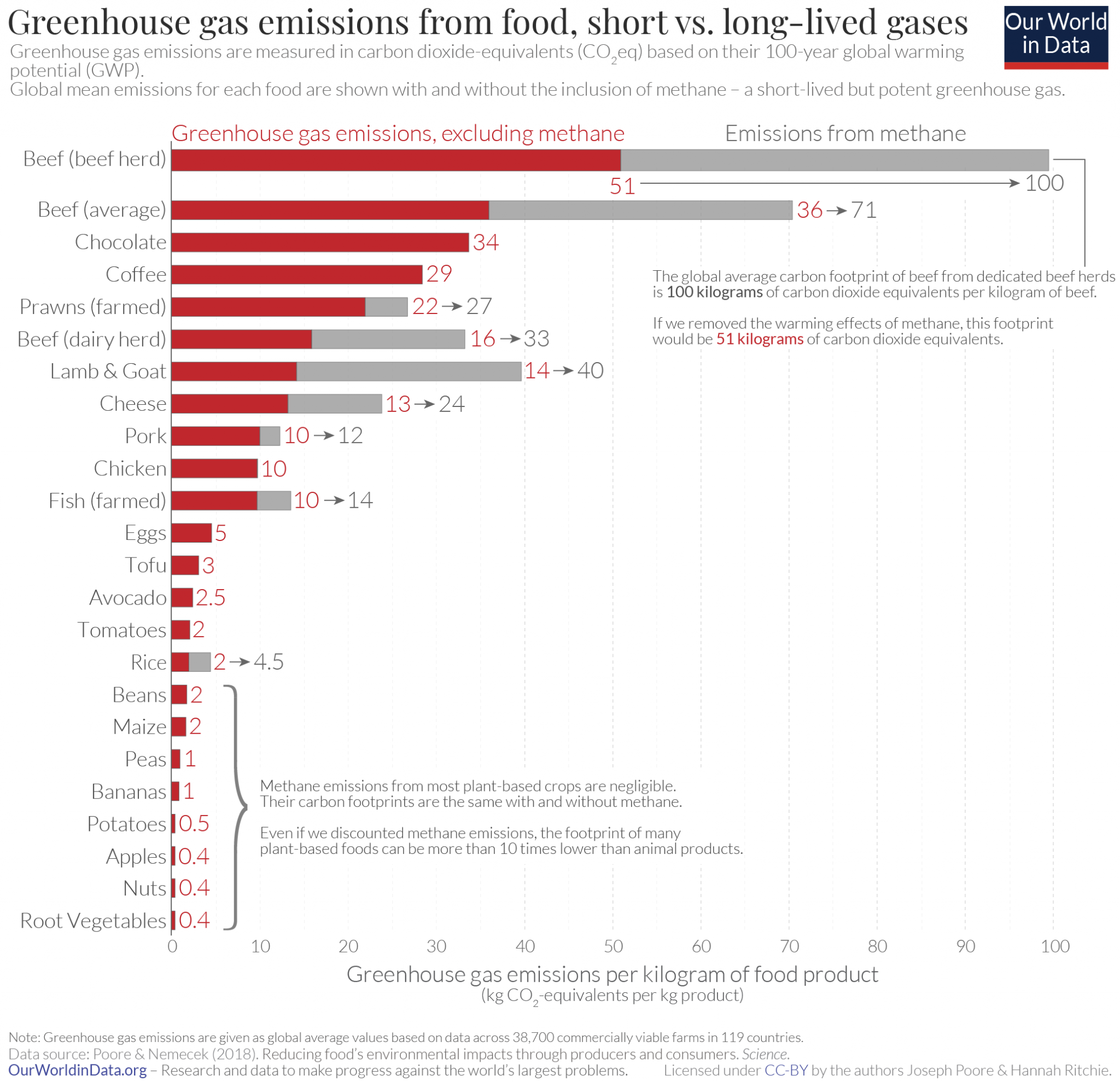The great thing about meat and dairy consumption is that it is linear; if you eat 50% less you cause 50% less pain. Instead of trying to go full vegan, go half-vegetarian first. The next step can be taken later.
Climate - truthful information about climate, related activism and politics.
Discussion of climate, how it is changing, activism around that, the politics, and the energy systems change we need in order to stabilize things.
As a starting point, the burning of fossil fuels, and to a lesser extent deforestation and release of methane are responsible for the warming in recent decades:

How much each change to the atmosphere has warmed the world:

Recommended actions to cut greenhouse gas emissions in the near future:

Anti-science, inactivism, and unsupported conspiracy theories are not ok here.
Vegans love to conflate all meat into one big group because their goal is to make veganism look good in comparison.
In reality, beef is the main problem.

It would be a lot more environmentally effective to convince people to reduce beef consumption and replace it with chicken/pork instead, but vegans aren't interested in that because for them it's not really about the climate - it's about reducing animal suffering and death.
This duplicity muddies the waters and makes getting real actual change that would benefit the climate harder to achieve and less likely to happen.
I would hazard saying "environmentally effective" here unless we are willing to ignore some of the other large environmental issues with meat production outside of just green house gases emission. Plant-based foods are lower not just on GHG emissions, but water usage, land usage, eutrophication, fertilizer usage^1^, etc.
There's all kinds of other pollutants such as Nitrogen runoff. The rise of the pig farming is has helped fueled a crisis in Nitrogen runoff in the Netherlands for instance
There's the high level of antibiotic usage to maintaining the high levels of production fueling antibiotic resistance.
And so on.
If we do want to look at the suffering, we should also note that chicken farming does not just keep things the same, but actually makes it worse with more chickens required than other creatures due to their smaller size.
^1^ Even less synthetic fertilizer even compared to the maximal usage of manure per https://www.sciencedirect.com/science/article/abs/pii/S0921344922006528
EDIT: I should also mention that land use change (deforestation) factor can change as you rapidly increase these industries size. Deforestation makes up a large portion of beef's current emissions. Plant-based foods require overall less cropland due to not needing to grow any feed and removing that energy loss. This is not the case for chicken production. Currently beef does make up the majority of Amazonian deforestation, however, the second largest portion is growing animal feed primary for chickens. Switch from beef to chickens and you might risk just moving around where the deforestation comes from
Saving the climate is not going to be done by guilting consumers into changing individual consumption habits. Enough with the green consumerist bullshit that only serve as neoliberal justifications for inaction.
If the meat industry is hurting the planet, REGULATE IT.
You can’t even get people to oppose livestock subsidies, and you’re talking about proactive blocks? The action you propose has the least chance of success. Individuals with self-control is the only certain action you can count on.
The problem is not that the method that meat is produced, it is that it is produced at high levels at all. The inefficiencies don't go away by changing regulations. We are going to have to have changes in production and thus consumption levels. It's going to be difficult politically to get any policy like that through if people are unwilling to reduce any on there own as well
Do I think systematic actions are needed, yes, but if we're going to get there we'll have to start with some degree of individual action before any of it is paltable to the larger society
I don't think it's worth fighting the meat industry when the other big Corp companies are harming the ecosystem far heavier. The Argicultural industry is 4th largest, so I think main efforts should be regulating big power, manufactoring sector or the oil sector honestly.
If you want to hit climate targets, it's extremely important
To have any hope of meeting the central goal of the Paris Agreement, which is to limit global warming to 2°C or less, our carbon emissions must be reduced considerably, including those coming from agriculture. Clark et al. show that even if fossil fuel emissions were eliminated immediately, emissions from the global food system alone would make it impossible to limit warming to 1.5°C and difficult even to realize the 2°C target. Thus, major changes in how food is produced are needed if we want to meet the goals of the Paris Agreement.
(emphasis mine)
41% of the land in the US is used for meat production, and 1/3rd globally. The Amazon rainforest is being slashed and burned for cattle farming. Animal agriculture means habitat destruction and is a large part of why 21 species were declared extinct in the US this past year. We can and must fight them both.